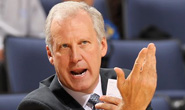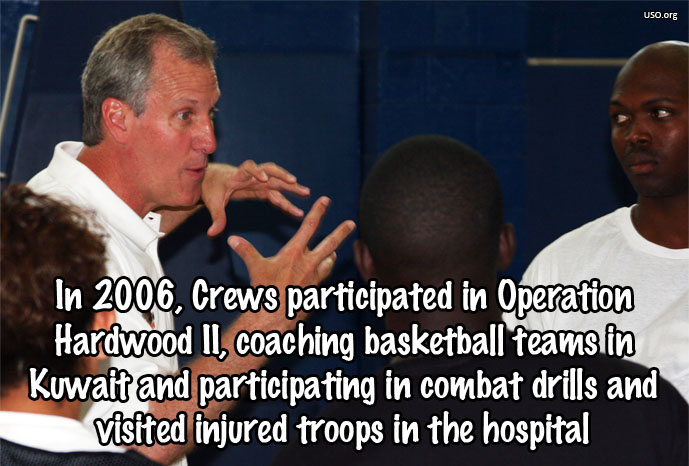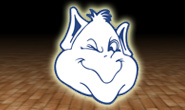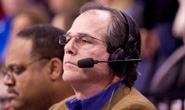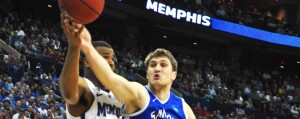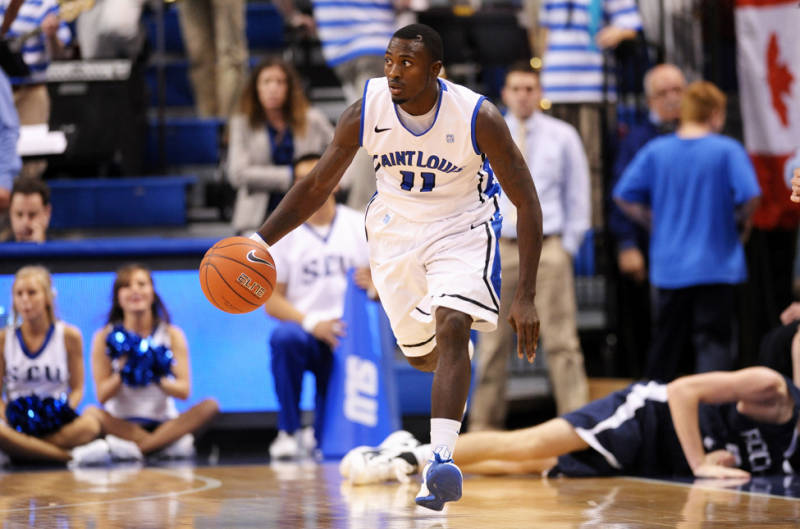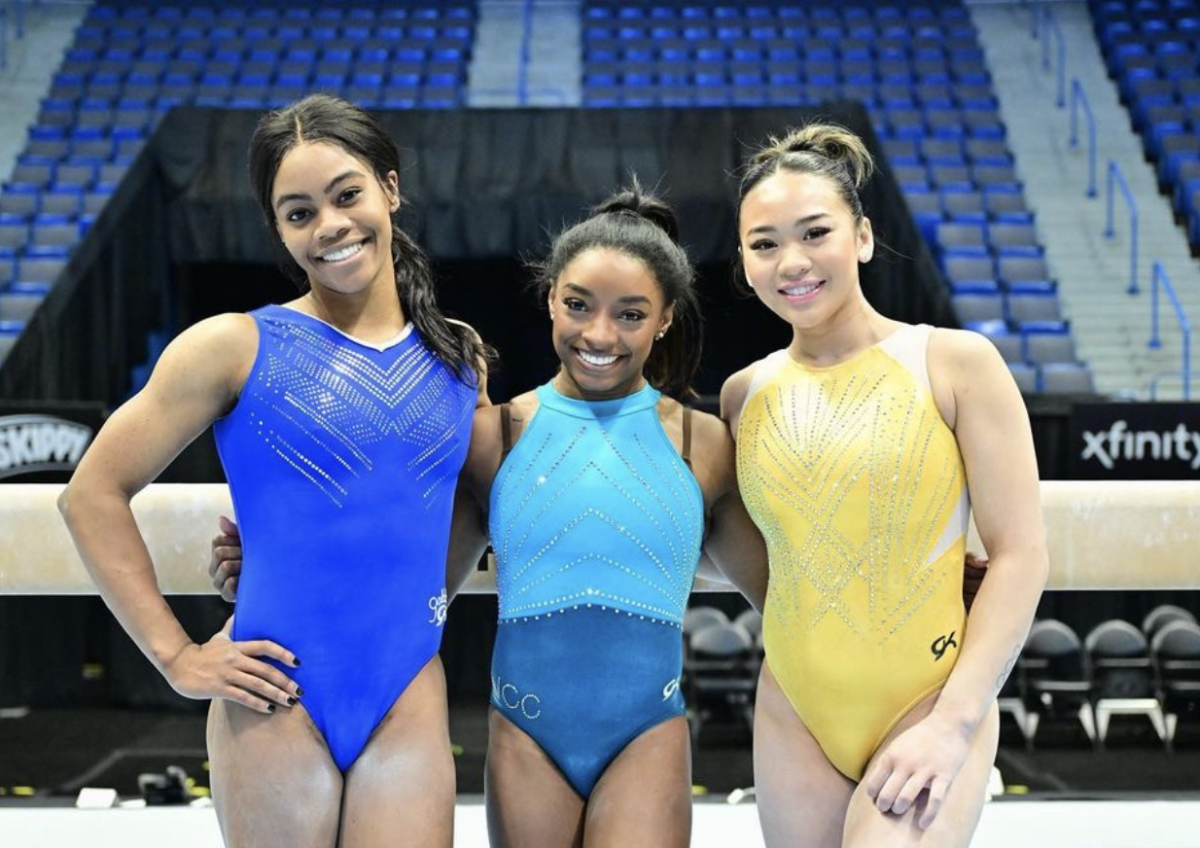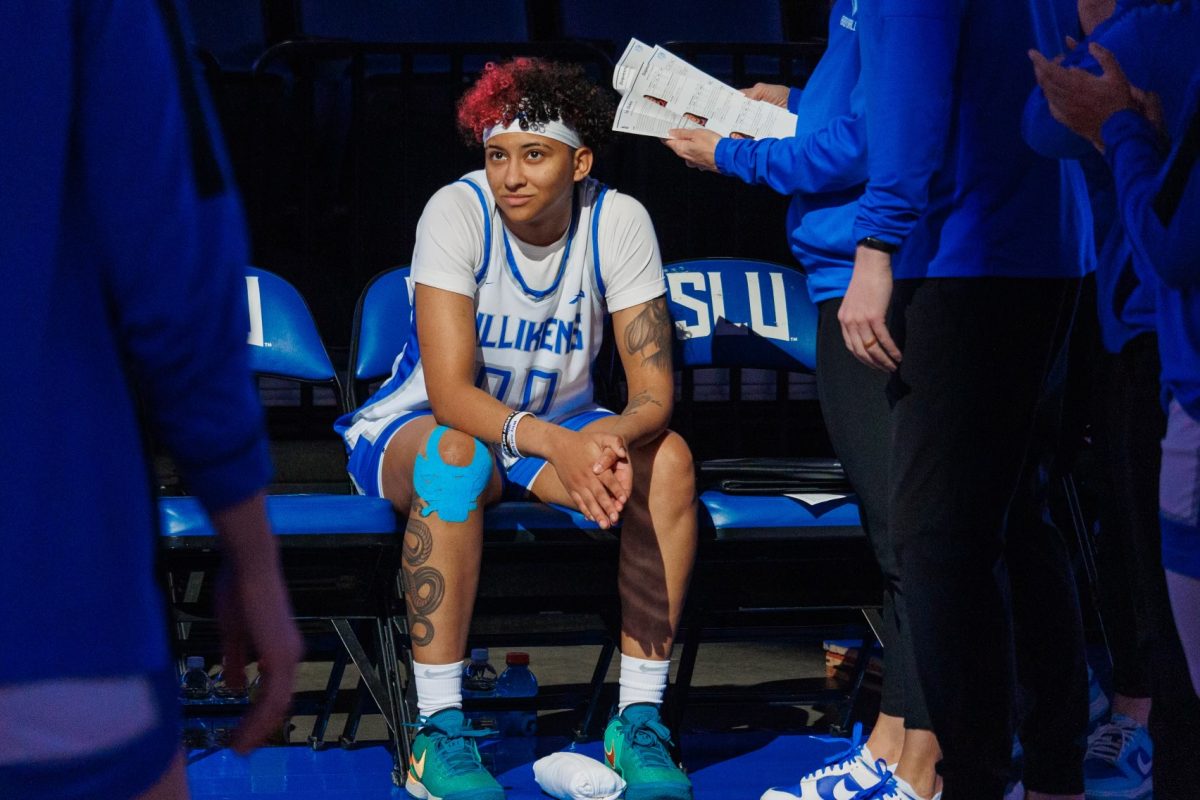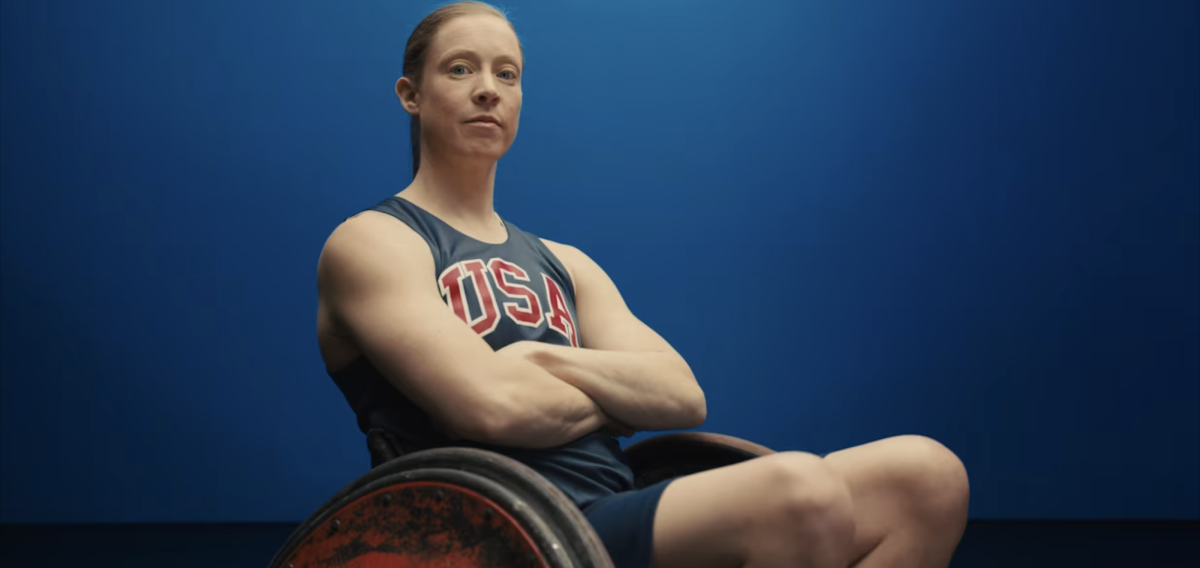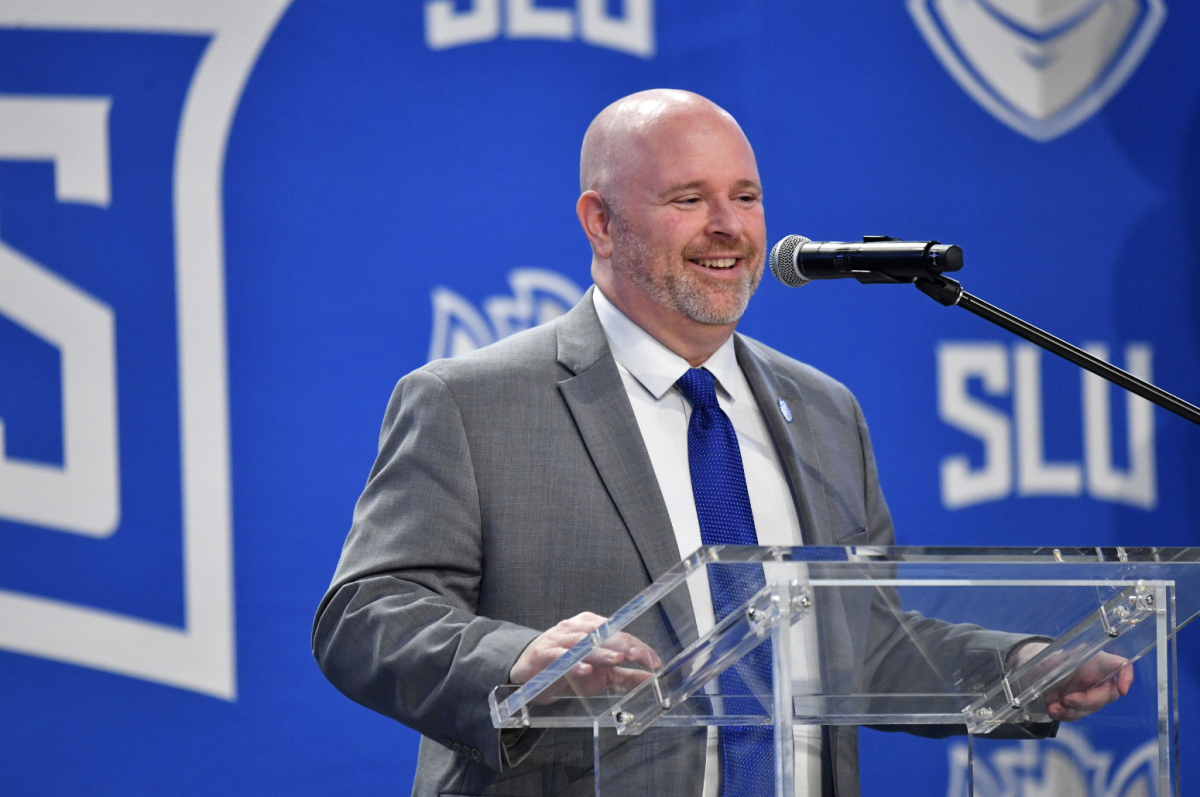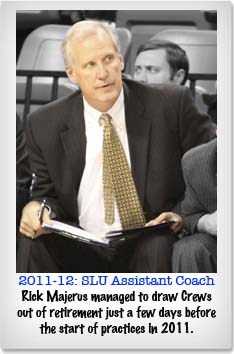 Jim Crews had no intention of returning to coaching when Rick Majerus called him last October.
Jim Crews had no intention of returning to coaching when Rick Majerus called him last October.
It had been over three years since his tenure as the men’s basketball coach at Army came to an abrupt end and Crews had since moved with his wife Kim to Indianapolis.
Sure, he was still “involved” with the game. He had tried his hand at broadcasting, working as a TV analyst for the Big Ten Network, and even helped out with a few basketball camps and clinics at a local elementary school. Nonetheless, he was content in retirement.
“Then the phone call,” Crews recalled as he leaned back in his chair. It was his long-time friend Rick Majerus. Their paths had first crossed during the 70s when Crews was a player at Indiana and Majerus, an assistant at Marquette.
“When I got into coaching after I graduated, we had just known each other from camps to clinics to just talking and I’ve always enjoyed his teams and he liked our teams,” he said, before adding with a smile, “We talked ball and had a good time. We’d eat a lot—I like to eat too.”
“It was about this time, almost exactly this time last year and Al Jensen was leaving,” Crews explained as we sat in his office just a few days before the start of practices.
Jensen, who had been an assistant coach at SLU for four years, had just accepted a head coaching position with an NBA Developmental League team in Canton, leaving Majerus just a few days before practice to fill the vacancy.
Crews was reluctant at first—and understandably so, but his old friend was desperate and simply would not take no for an answer.
“He tried to make it sound as short as possible by saying it would only be for 4 1/2 months,” Crews told Jeff Eisenberg of Yahoo! Sports. “He said, ‘There’s no dress code, all the food you can eat, we’ll laugh a lot and I think we can really win.’ What else do you want in a job besides that? Eventually, I told my wife, ‘What the heck, let’s do it.’ ”
“It was—we were only going to do it for a year,” he recalled.
That year has since come and gone and Crews now finds himself at the helm of the entire program. “The best-laid plans are not as clear a vision as you think they are,” he said with a smirk.
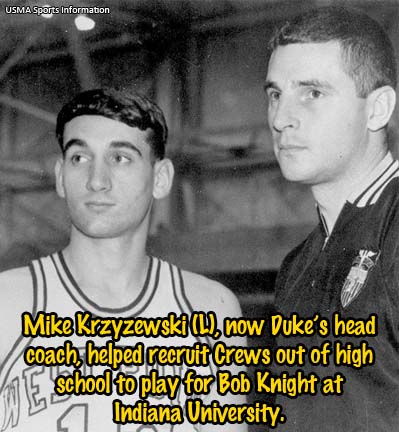 Recruited out of high school to play for Bob Knight at Indiana by a young Army officer named Mike Krzyzewski, Crews benefited from an NCAA rule change that allowed freshmen to participate in varsity sports, starting in 22 of 28 games for Indiana. He, along with fellow freshmen Quinn Buckner, provided a lethal one-two punch for the Hoosiers, who pushed through the first two rounds of the NCAA Tournament before falling to UCLA in the National Semifinals.
Recruited out of high school to play for Bob Knight at Indiana by a young Army officer named Mike Krzyzewski, Crews benefited from an NCAA rule change that allowed freshmen to participate in varsity sports, starting in 22 of 28 games for Indiana. He, along with fellow freshmen Quinn Buckner, provided a lethal one-two punch for the Hoosiers, who pushed through the first two rounds of the NCAA Tournament before falling to UCLA in the National Semifinals.
Despite claiming two more Big Ten titles, the Hoosiers failed to even reach the NCAA Tournament in 1973-74 and saw their title aspirations go down with consensus All-American Scott May in 1974-75.
“That’s how fragile it is. You have to be really good, but you have to be a little lucky too and we weren’t. We had some bad luck, but we weren’t quite lucky enough either.” Crews said of the 1974-75 Hoosiers, who finished the year at 31-1 after falling to Kentucky in the third round of the NCAA Tournament.
The disappointment of failing to bring home a National Championship for the third year in a row had Crews and his fellow IU seniors determined to go out on top.
“We had wanted to win four Big Ten Championships in a row, because we had won three and…[it] was always a huge deal for us,” he recalled. “Then, obviously the year before, we really had a great team and didn’t win it because our best player, Scott May, broke his arm, so that’s the only thing that was missing in the four years that we were there was a National Championship.”
The Hoosiers accomplished both of their goals in astonishing fashion, finishing the regular season with a 32-0 record—a feat that has not been accomplished since.
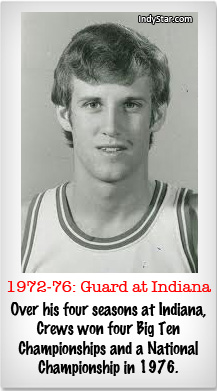 “We really had great guys,” Crews reminisced as he leaned back, smiling. “I think that’s what was neat about it—from the head coach to the assistant coaches to the players, there was good relationships that really continue today. A lot of people will ask about those teams, but the main thing is that we’ve been friends since we were 18 years old. So, that’s what’s pretty cool.”
“We really had great guys,” Crews reminisced as he leaned back, smiling. “I think that’s what was neat about it—from the head coach to the assistant coaches to the players, there was good relationships that really continue today. A lot of people will ask about those teams, but the main thing is that we’ve been friends since we were 18 years old. So, that’s what’s pretty cool.”
Just a year after graduating, Crews returned to Indiana, this time as an assistant on Knight’s staff.
“It was great. We enjoyed it,” Crews said of playing and coaching for The General. “He was very demanding, obviously, but he was a great teacher and we saw probably a different personality at times than other people would see.”
Under Knight’s tutelage, the young assistant claimed his second NCAA championship in 1981, but it wasn’t until March 3, 1985 that he got his first shot at being a head coach. Unbeknownst to Crews, who had missed practice while on a recruiting trip, Knight had been suspended for a game after he threw a chair across the court during Indiana’s game versus Purdue.
“It’s kind of funny because…I get in real late the night before the game and no one was up, so I just went to bed,” Crews explained. “So, we’re going through the walk through in the ballroom… and he comes up to me afterwards and says, ‘Oh yeah, you’re coaching. They suspended me.’ ”
While Evansville coach Marty Simmons, an Indiana sophomore at the time, remembered the game as simply being “business as usual,” it certainly wasn’t that way for Crews.
“I didn’t even know the game plan to tell you the truth!” he laughed. “I had been gone for two days, so it was a little bit of a unique experience.”
Even though Iowa manhandled Indiana in that game, Crews earned his first head coaching position at Evansville University after the season.
“I’m really excited about Jimmy’s start as a basketball coach at Evansville, because I think it’s going to be the beginning of a long and very successful career in coaching for Jimmy,” Knight said in a video to the Evansville fans. “I think that as I’ve had people go away from here to coach in other places, never have I been as enthused about what I’m looking forward to seeing in a former coach’s team as I am in Jimmy’s.”
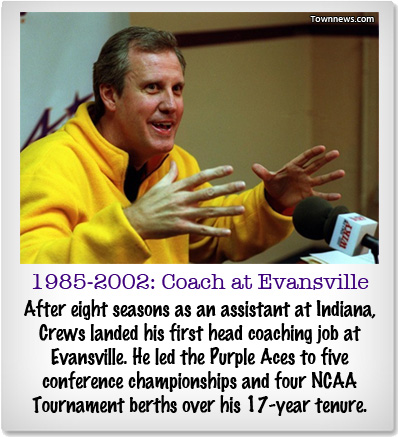 While the Purple Aces struggled in their first season under Crews, a change in the program’s culture had already begun, due in large part to Simmons, who left Indiana after a drop in minutes to play for Crews at Evansville.
While the Purple Aces struggled in their first season under Crews, a change in the program’s culture had already begun, due in large part to Simmons, who left Indiana after a drop in minutes to play for Crews at Evansville.
“I don’t think I’ve ever seen a guy do a better job of transforming a team and he wasn’t even eligible…because of the transfer,” Crews said of Simmons. “He changed that culture without even playing one second that year. I thought that was just an amazing job of leadership on his part.”
“The first team he coached you could tell how much they improved from the start of the season to the end of the season,” Simmons explained. “So, even though they didn’t win a lot of games in that first year, there was momentum from just the improvement…we certainly felt confident as we headed into what was our first year playing and his second year as head coach.”
With the key transfers he brought with him to Evansville finally eligible, Crews and the Purple Aces began their resurgence in 1986-87, finishing tied atop the Midwestern Collegiate Conference Standings at 16-12.
Evansville went on to win their first postseason game at the Division I level the following year, before reaching the NCAA Tournament for the first time in nearly a decade in Crews’ fourth season.
“I tell people all the time and I’m not sure they believe me, but it was incredible,” Simmons said. “My senior class at Indiana won a National Championship [in 1987] and I certainly wouldn’t trade my experience at the University of Evansville, playing for coach Crews, for a National Championship. To see the excitement and how this community came together and supported our basketball team was just incredible. I wouldn’t trade it for anything in the world.”
Crews, whose nine consecutive non-losing seasons still stands as the school record, led the Purple Aces to five regular season conference championships and a pair of MCC Tournament championships over his 17-year tenure. The four-time conference coach of the year also helped them to six postseason appearances, including four trips to the NCAA Tournament.
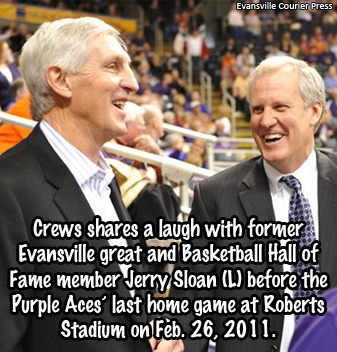 “We knew as players, that there would never be an opponent that we played against that was more prepared than us,” Simmons said. “He was a student of the game. He’s a detail-oriented coach that focuses on fundamentals. He never lets a detail get by. There are times that you’d think like ‘How in the world did he see that?’. He’s a very, very attentive coach.”
“We knew as players, that there would never be an opponent that we played against that was more prepared than us,” Simmons said. “He was a student of the game. He’s a detail-oriented coach that focuses on fundamentals. He never lets a detail get by. There are times that you’d think like ‘How in the world did he see that?’. He’s a very, very attentive coach.”
Evansville fell on hard times with the turn of the century, however, and after a 7-21 finish to the 2001-02 campaign, Crews decided it was time for a change.
“It was just kind of time,” he said. “I had been there a long time and my kids were grown, so that was good that we didn’t hop around when they were growing up…I think Evansville probably needed a change and it was healthy for us to change.”
In a shorter, six-year stint at the United States Military Academy, Crews amassed a much less gaudy, 59-140 record. His time at West Point ended abruptly in 2009, when Crews was terminated just weeks before the start of the season.
Despite the rather controversial end to his time at Army, Crews lauded West Point, suggesting that every American pay a visit to the Military Academy.
 “I think [Crews’] years at being at Army and with all the things he had to deal with there—no body understands that anymore or any better than he does with those guys then going on to combat and stuff,” Simmons said. “He’s a breath of fresh air and he’s somebody that I look at as a mentor and respect.”
“I think [Crews’] years at being at Army and with all the things he had to deal with there—no body understands that anymore or any better than he does with those guys then going on to combat and stuff,” Simmons said. “He’s a breath of fresh air and he’s somebody that I look at as a mentor and respect.”
Following the tumultuous end to his seven-year tenure with the Black Knights, Crews admitted that he had no intention of coming out of retirement. But then, as he so eloquently put it during our interview, “the phone call.”
“Jim’s career has been distinguished by coaching prowess [and] the success of his teams and of course the graduation rate of his student-athletes, which approximates 100 percent,” Majerus said when he hired Crews. “We are fortunate to have him on board as a Billiken. Our players are looking forward to being coached by a tremendous teacher and educator.”
One 26-win season later and Crews found himself back for another season with the Bills as an assistant.
Oddly enough, the same coaching experience that led Majerus to add Crews to his staff in 2011 also made him the top candidate to take over as interim head coach when Majerus was forced to take a leave of absence in August.
“I had to think about it because if you do it you have to be all in. You can’t dibble and dabble,” Crews admitted to Eisenberg. “But first of all the staff is really fun to be around. We all get along great. The players we have coming back are enjoyable too. And the administration was very, very honest. When you know exactly what the truth is, it’s easy to get things done.’
Even though he never expected to be in this position, Crews finds himself at the helm of a Billiken team looking to reach the NCAA Tournament in consecutive seasons for the first time since early in the Charlie Spoonhour-era.
With all but two players returning, Crews has remained steadfast in his commitment to maintain the system of play his team is accustomed to, with an emphasis on using last year’s success as a building block, not as an excuse to become complacent.
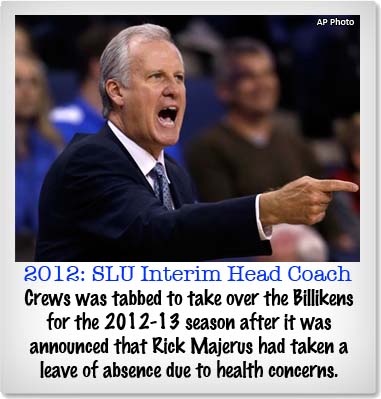 “[Last year’s tournament run] gives the guys the knowledge that they are capable of really doing well,” he said. “Hopefully, they’ll also understand the slim margin of error that you have to get to that point and you’re coming from a different place. This year everyone thinks we’re good. We’re not any good today, but hopefully we…get to be good, but that’s part of the process. You don’t start off with 25 wins. You start off with zero.”
“[Last year’s tournament run] gives the guys the knowledge that they are capable of really doing well,” he said. “Hopefully, they’ll also understand the slim margin of error that you have to get to that point and you’re coming from a different place. This year everyone thinks we’re good. We’re not any good today, but hopefully we…get to be good, but that’s part of the process. You don’t start off with 25 wins. You start off with zero.”
When asked to reflect on the journey that led him to this point, Crews simply offered an adage his parents taught him when he was younger. “You’ve got to learn from your past, live in the present and just kind of peek in the future.”
UNews Online Exclusive: Check out video of coach Knight’s endorsement of Jim Crews, along with our full interviews with Crews and Marty Simmons here.
Brian Haenchen covers the Saint Louis University men’s basketball team for The University News. You can follow him on Twitter (@Brian_Haenchen) or email him ([email protected]).

